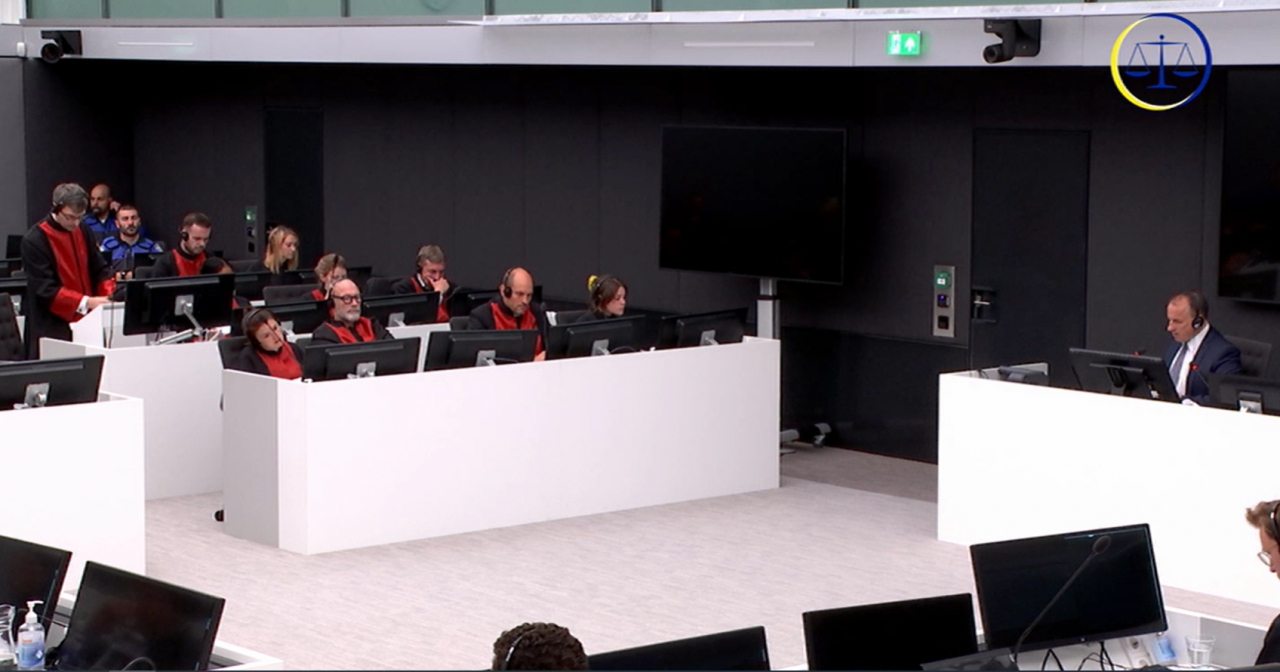

 Francis Ledwidge (right) at the Kosovo Specialist Chambers on Wednesday. Photo: Livestream/Kosovo Specialist Chambers.
Francis Ledwidge (right) at the Kosovo Specialist Chambers on Wednesday. Photo: Livestream/Kosovo Specialist Chambers.
A British intelligence officer who was in Kosovo during the war told the trial of Hashim Thaçi and other former guerrilla leaders that the Kosovo Liberation Army displayed “organisation and coordination” when kidnapping Serb civilians in the Rahovec/Orahovac region.
Francis Ledwidge, a British intelligence service officer who was part of the OSCE mission in Kosovo during the war and focused on investigating the fate of missing persons in 1998, mainly in Rahovec/Orahovac, testified on Tuesday and Wednesday in The Hague that despite disagreements within the Kosovo Liberation Army, KLA, the guerrilla force showed “a level of organisation and coordination” when seizing civilians.
‘‘It was clear to point out from everyone that there were disagreements within the KLA,” Ledwidge told the court. But he also said that “the level of the organisation and coordination of kidnapping of civilians in Rahovec and the region speaks to me of a level of organisation and not a mess”.
Ledwidge was the 14th witness in war crimes and crimes against humanity trial of former President Hashim Thaci and his three co-accused at the Hague-based Kosovo Specialist Chambers.
Ledwidge claimed to have been responsible for investigating the fate of 45 missing persons in Rahovec/Orahovac, the majority being ethnic Serbs who were believed to have been kidnapped by the KLA around mid-July 1998, and for finding the remains of around 150 ethnic Albanian civilians who were murdered by Serbian forces.
According to the indictment, from May to mid-July 1998, 38 detainees were held by KLA members in the Drenoc/Drenovac detention centre in Rahovec/Orahovac. Around ten were murdered and four were forcibly disappeared.
The witness claimed that Serbian forces “tortured KLA prisoners for [information on] the Serbian prisoners”, adding that Serbia was a “torturing state”.
Although he said that there were more ethnic Albanian victims, he alleged that some KLA members also used similar tactics.
According to the indictment, in July 1998, after a KLA attack in Rahovec/Orahovac, various members of the KLA’s General Staff including the accused were seen in the vicinity.
Defendant Jakup Krasniqi was reportedly seen in Malisheve/Malisevo, where the detention centre had eventually been relocated.
In his testimony, Ledwidge recalled interviews he had with former detainees in which at least two of them had mentioned Krasniqi’s presence. However, Ledwidge said that he never met Krasniqi himself, nor any other General Staff member.
Krasniqi’s defence maintains that he was not in the area in July 1998, and noted that one of the former detainees interviewed by Ledwidge during his investigation had not been able to indentify a photo of Krasniqi.
Thaci and his co-defendants Kadri Veseli, Petrit Selimi and Krasniqi, are accused of having individual and command responsibility for crimes that were mainly committed against prisoners held at KLA detention facilities in Kosovo and neighbouring Albania, including 102 murders. They have pleaded not guilty to all charges.
The defendants, who all became senior politicians in Kosovo after the war, allegedly committed the crimes between at least March 1998 and September 1999, during and just after the war with Serbian forces.
The Kosovo Specialist Chambers were set up in 2015 by the Kosovo parliament, acting under pressure from Kosovo’s Western allies, who believed that Kosovo’s own justice system was not robust enough to try KLA cases and protect witnesses from intimidation. Previous trials at the Yugoslav war crimes tribunal were marred by witness-tampering.
The 15th witness started testifying via video link on Wednesday afternoon and will speak about the death of their brother, allegedly after having been kidnapped by KLA members in July 1998 in Drenoc/Drenovac.
19 July 2023 - 21:18

At the close of their trial in The Hague, the four former Kosovo Liber...

The defence for the four former Kosovo Liberation Army leaders said in...

Kosovo ex-President Hashim Thaci's defence said during closing stateme...

In closing statements, prosecutors said that ex-president Hashim Thaci...